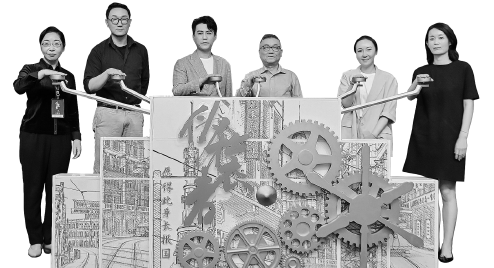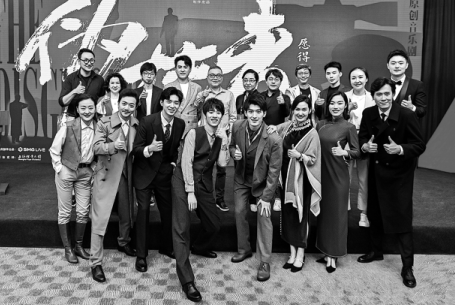Start of a new 'song dynasty'
With Shanghai Musical Art Center's first large-scale original production set to hit the stage, those involved say it represents a watershed for domestically conceived, Western-style musicals, He Qi reports.

Shanghai Musical Art Center's first large-scale original musical since its establishment in 2019-the first part of The Disguiser, also known as Weizhuangzhe-will be performed at Shanghai FANCL Art Center from Sept 15.
Co-produced by Shanghai Media Group Live, the musical originates from the espionage novel Spy in the Bund by scriptwriter Zhang Yong, which was adapted into a TV series in 2015.
"Since launching the center, we have been thinking about what kind of musicals will be able to present the spirit of Shanghai and the contemporary era. After researching different subjects, we felt that The Disguiser is not only a great story about the Communist Party of China, more importantly, it will resonate with the time and inspire our younger generations to think about their lives," says Ma Chencheng, CEO, SMG Live.
Zhang Yong, author of the story, believes that such musicals will help to deliver Chinese culture to foreigners.
"Since The Disguiser is set against a Chinese cultural backdrop, we can deliver domestic themes and stories to the international stage through such foreign art forms," Zhang says.
The Disguiser will be separated into a trilogy, the first part of which puts two brothers, Ming Cheng and Ming Lou, as main characters and tells their story as a new government official and a Kuomintang spy, delivering a multidimensional espionage story about the elite agents of the Party.
Cao Yang, musical actor and singer who has performed in the musical Secret and won the New Supporting Actor category at the 27th Shanghai Magnolia Drama Performance Art Awards, will play Ming Cheng. Ju Hongchuan and Liu Yang, who have participated in different musicals before, will perform Ming Lou in turn.
"We are not simply making a live-action adaptation of the TV drama. In fact, the scriptwriter has written many extra episodes for the musical to make it different," says Ma, who is also the director of the musical.
"Therefore, both fans of the musical and the TV drama can enjoy surprises and explore new elements to the story on our musical stage," he adds.
Being a musical producer for the first time, Jin Dong, the actor played the role of Ming Lou in the TV version of The Disguiser, points out that the musical was not only a challenge for himself, but also for the market for musicals in China.
"Objectively speaking, Chinese musicals, as a genre, is still in its infancy," Jin says.
"Although we have entered into the third stage of musical development-from the introduction of the original foreign musicals to China, their Chinese adaptations and then to the creation of original domestic musicals-we're just getting started," he adds.
According to Jin, since the theater genre is imported, it is a bit paradoxical performing it in Chinese, with national characters and the implication of our culture.
But compared with other forms of stage art, the musical is the only one that can make people feel excited in the shortest time.
"After my accumulated experience and knowledge of the past 20 years, I believe The Disguiser will be a great play," Jin says.
Behind the successful incubation of The Disguiser is actually a growing domestic musical market.
Ma gave the example of The Phantom of the Opera, which has been played in China for nearly two decades.
It used to be performed in no more than two cities in China, for a four-week run in each. However, the upcoming Chinese tour of the production plans to run for two years with performances in more than 20 cities, Ma says.
"It is obvious to see that musicals are a growing market in China," he adds.
As one of the first venues producing local musicals, Shanghai Musical Art Center has introduced many classic Western musicals to the local market in Chinese, including The Phantom of the Opera and Mamma Mia. But Ma says only excellent, original musicals can promote the local industry.
"The production of the Chinese version only helps copyright owners to develop the Chinese market. To really be accepted by the Chinese audience on the local stage, it is still necessary to tell our stories and to perform Chinese musicals," Ma says.
To further promote the market, Ma says the center will continue to cultivate talent and produce more original musicals, alongside its adapted Western productions.
According to Ma, content related to traditional culture, historical stories, the Party and espionage are more likely to be accepted by local audiences, because these are the stories that can touch contemporary audiences.
"China has a large market, and our artists are creative. With more original works produced in China, and more experience accumulated by our team, the future of Chinese musicals will be bright," he says.


Today's Top News
- Beijing accuses Manila of trying to smear China's actions in the South China Sea
- Scientists using Chinese telesecope capture evolutionary process of mysterious flashes
- Xi: Advance building of China-Canada new strategic partnership
- Xi receives credentials of new ambassadors to China
- China's giant radio telescope observations unravel origin of cosmic enigmatic flashes
- Xi meets Canadian prime minister






























